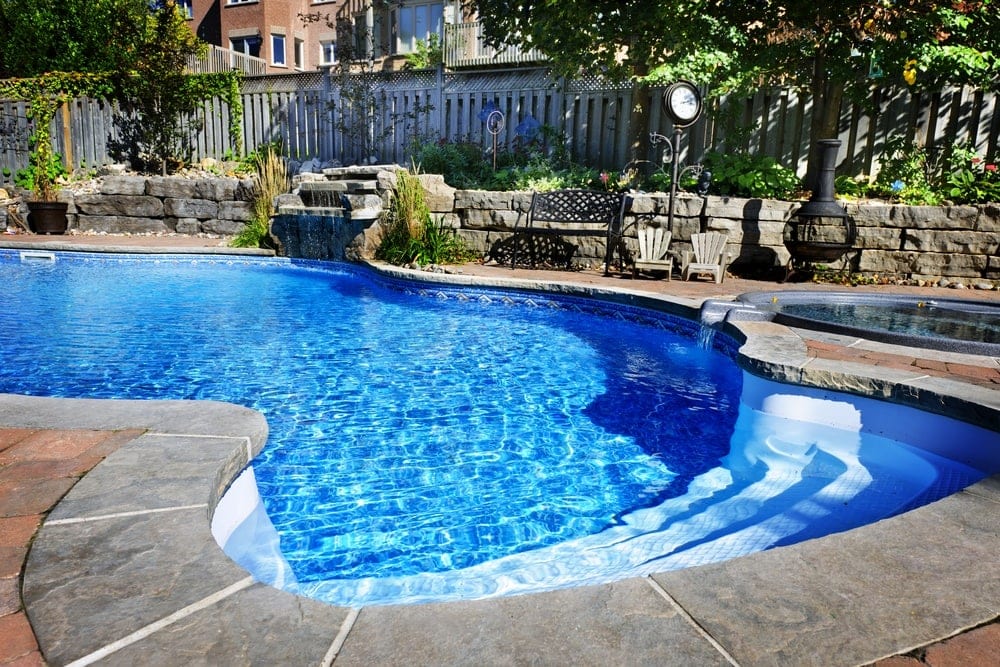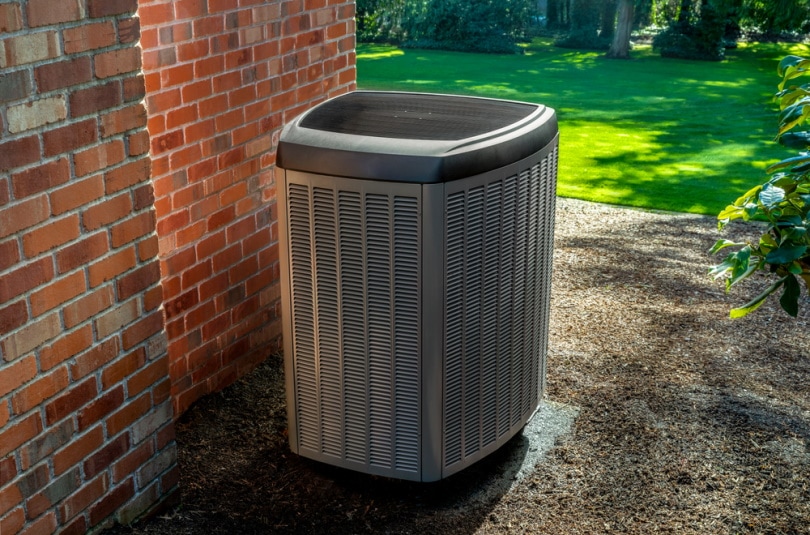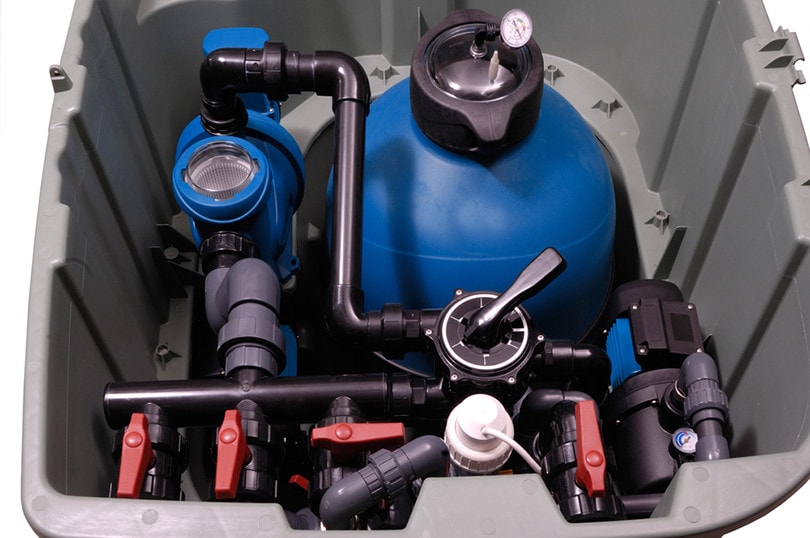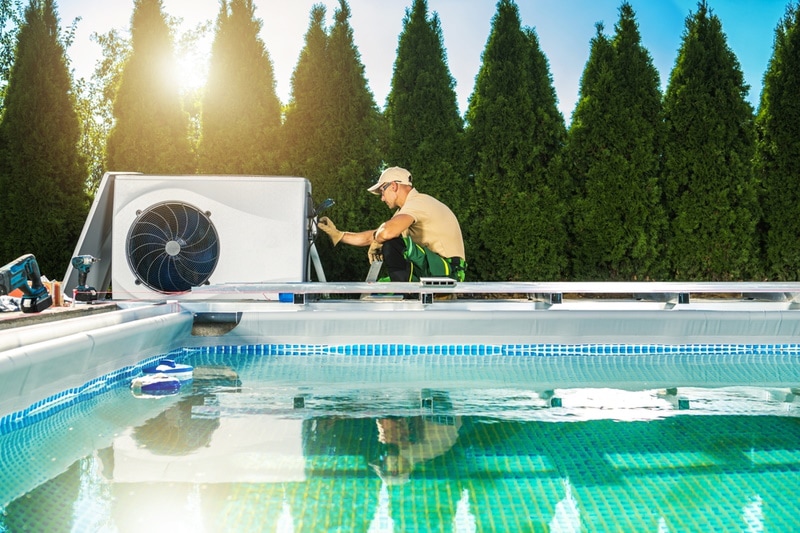How Does a Pool Heat Pump Work? Advantages, Disadvantages & Types
-
Pete Ortiz
- Last updated:

Swimming pool heat pumps are similar to air conditioning units and even power stations. They use a combination of fans, refrigerants, and pipes. The system pulls in warm air, which is used to heat a gas inside the pump before the now warm gas is pushed through a compressor to further increase the heat. This heat is then transferred to the pool water as it passes through the system.
Heaters are used to heat otherwise cold pool water to a bearable temperature, and they are not only used to provide an inviting swimming environment, but they can also prevent pool water from freezing during the cold months. Heat pumps are used for indoor and outdoor pools and are deployed in pools around the world.
How Does It Work?
An electric heat pump does more than just pull in water and heat it. In fact, it doesn’t generate heat of its own accord at all but draws warm air in before using this warmth, magnifying it, and then heating the water as it passes through the system. It is an efficient method of heating water that essentially provides five units of heat energy for every unit of electricity used.
The heat pump first draws warm air in by using a fan to push air that has been heated by the sun from outside the fan inside the system. The air is passed over an evaporator coil, which warms a refrigerant gas within.
This warm gas is then passed to a compressor where it is compressed, effectively raising the heat even further. The now hot gas is passed back to the condenser, where it heats pool water that is being pumped through the system. The water is then expelled back into the pool and the process continues, ensuring that the overall temperature of the water rises.

What Are the Different Types of Pool Heat Pumps?
There are three basic types of pool heat pumps:
- Electric: Electric heat pumps use the system described above, drawing in air using a fan and using the warm air to heat a refrigerant gas. The gas is then heated before it is used to warm the pool water. This process is most effective at moderate to high environmental temperatures but even then, it can take some time to heat all of the water in a pool. It is more energy efficient than other systems, however. Electric pool heat pumps are said to be 500% efficient, which basically means that for every kilowatt-hour (kWh) of electricity used, 5 kWh of heat is produced.
- Gas: A gas pool heat pump is simpler and is capable of heating large pools of water in relatively little time. A pump forces water through a filter and into a heater. The water is warmed or heated before being passed back into the pool. Not only is this method quicker at heating a pool of water but it works equally as well when temperatures outside are freezing as it does on warm days. However, gas pool heat pumps are more expensive to run than electric ones, which is why they are less common.
- Solar: Solar heat pumps have become increasingly popular because once installed they have minimal running costs, although installation costs tend to be much higher than with an electric or gas heat pump. The pump draws water from the pool and passes it to a solar collector where the water is heated by the power of the sun. The water is then passed back into the pool. This type of system can take a long time to heat a pool and is inefficient at very cold and freezing temperatures, but effective when the sun is out.
Where Is It Used?
All types of heat pumps can be used for indoor and outdoor pools and the choice of which type is best will ultimately be determined by how quickly the pool water needs to be heated, as well as the ambient air temperature around the pool.
Outdoor swimming pools are most often used when the weather is warm. People are less inclined to go for an outdoor dip when temperatures are below freezing, although there are exceptions. For this reason, a gas pool heater is not usually necessary so pool owners can benefit from the energy efficiency of an electric pump or the free energy of a solar pump.
Solar pumps are obviously the most energy-efficient, although they do cost more to buy and install. You may need some kind of electric backup system to prevent water from freezing though.
Gas pool heater pumps are most often used when the temperature around the pool is very cold or when the pool needs to be heated to temperature quickly, for example in public swimming pools or if the pool is kept in an outdoor building with no heating.

Advantages of Pool Heat Pumps
When compared to a traditional pool heater, there are several benefits of using a pool heat pump:
- Cost-Effective Heating: For every kilowatt-hour of electricity a pool heat pump uses, it produces 5 kWh of heat. A traditional pool heater is only around 80% efficient, which means that it would take 6.25 kWh to produce the same 5 kWh of heat. An electric pool heat pump, although more costly to install, can be six times cheaper to run.
- Energy Efficient: As well as costing less to heat the pool, the improved efficiency of a pool heat pump means that you will use less energy and reduce your carbon footprint. It is better for the environment and reduces your exposure to fluctuating energy prices.
- Durable: Traditional heaters are prone to burn out so while they cost less than a modern pool heat pump, they will need more maintenance, cost more to repair, and will need replacing sooner. A heat pump is more durable and tends to have lower ongoing maintenance costs.
Disadvantages of Pool Heat Pumps
Disadvantages of a pool heat pump include:
- Less Efficient at Low Temperatures: Pool heat pumps use the air around the pump to warm water after being heated. If it is a cold day, and especially if it is below freezing, a pool heat pump is much less effective than during warmer months. This means that a pool heat pump is at its most efficient when the air may be warm enough that you don’t need to heat a pool.
- Higher Initial Costs: Although a pool heat pump will cost less in the long run, it has a much higher entry cost. The system is more complicated and therefore costs more than a traditional pool heater.
Frequently Asked Questions (FAQs)
How Long Does It Take to Heat a Pool With a Heat Pump?
The exact amount of time it takes to heat a pool with a heat pump depends on the size of the pool, the starting temperature of the water, and the ambient air temperature. It could take as long as 48 hours to warm a pool to the desired temperature.
Do Pool Heat Pumps Run All the Time?
You should not have to leave a pool heat pump running all the time. Most have a thermostat that will turn the pump off when the pool reaches the desired temperature and will start up again when it falls to a low temperature. This can prevent the water from freezing in winter and also means that you won’t have to wait 48 hours for the pool to heat up every time you want a swim.
Does a Pool Heat Pump Need to Be in the Sun?
Generally, a pool heat pump will be at its most efficient if installed in direct sunlight, but it doesn’t necessarily need to be. The pump uses air that has been warmed by the sun and does not directly take heat from the sun’s rays.

 Conclusion
Conclusion
A pool heat pump is one method of heating swimming pool water. It is generally considered more efficient than a traditional pool heater and will reduce pool heating costs considerably, although it does cost more to initially buy and install. Heat pumps are less efficient at lower temperatures, however, and there may be some instances where a traditional heater is the best option.
Featured Image Credit: Elena Elisseeva, Shutterstock
Contents


